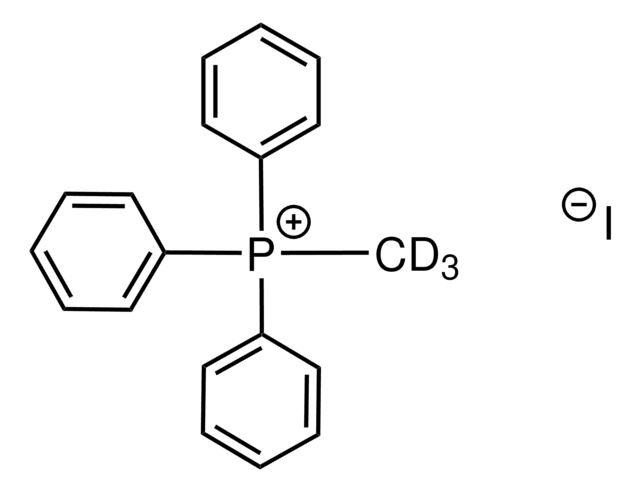176036
Iodomethane-d3
≥99.5 atom % D, ≥99% (CP), contains copper as stabilizer
Synonym(s):
Deuterated iodomethane, Methyl-d3 Iodide
About This Item
Recommended Products
vapor density
4.89 (vs air)
Quality Level
100
200
vapor pressure
22.76 psi ( 55 °C)
6.61 psi ( 20 °C)
isotopic purity
≥99.5 atom % D
Assay
≥99% (CP)
form
liquid
contains
copper as stabilizer
refractive index
n20/D 1.5262 (lit.)
bp
42 °C (lit.)
mp
−66.5 °C (lit.)
density
2.329 g/mL at 25 °C
application(s)
environmental
mass shift
M+3
storage temp.
2-8°C
SMILES string
[2H]C([2H])([2H])I
InChI
1S/CH3I/c1-2/h1H3/i1D3
InChI key
INQOMBQAUSQDDS-FIBGUPNXSA-N
Looking for similar products? Visit Product Comparison Guide
General description
Packaging
accessory
Signal Word
Danger
Hazard Statements
Precautionary Statements
Hazard Classifications
Acute Tox. 3 Inhalation - Acute Tox. 3 Oral - Acute Tox. 4 Dermal - Aquatic Acute 1 - Aquatic Chronic 1 - Carc. 2 - Eye Irrit. 2 - Skin Irrit. 2 - STOT SE 3
Target Organs
Respiratory system
Storage Class Code
6.1B - Non-combustible acute toxic Cat. 1 and 2 / very toxic hazardous materials
WGK
WGK 3
Flash Point(F)
Not applicable
Flash Point(C)
Not applicable
Choose from one of the most recent versions:
Already Own This Product?
Find documentation for the products that you have recently purchased in the Document Library.
Customers Also Viewed
Our team of scientists has experience in all areas of research including Life Science, Material Science, Chemical Synthesis, Chromatography, Analytical and many others.
Contact Technical Service














